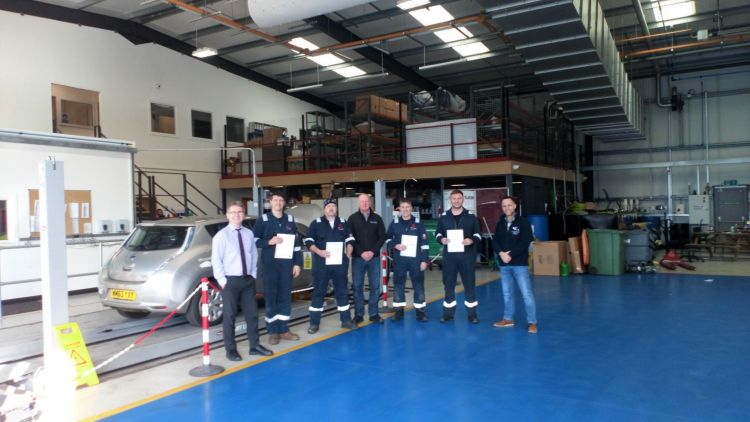Unite supports Swansea Council to train staff in electric vehicle maintenance
Swansea Council currently has 60 electric vehicles in its fleet. A further 200-300 will be introduced in the next few years. When electric vehicles were first introduced into the fleet, maintenance was subcontracted out. But the pandemic revealed that this was not a resilient strategy. Outsourcing the work also put vehicle maintenance jobs at Swansea Council at risk. So, the Council made the decision to bring the work back in house.
Mark Barrow is the Fleet Manager of the Central Transport Unit at Swansea Council. He realised that workers urgently needed training for electric vehicle maintenance and discussed the matter with Jason Strannigan, Unite Convenor at Swansea City Council Unite branch.
Unions opening the door to training opportunities

Unite has a long-standing relationship with the Council. A few years ago, Unite helped to provide training for Heavy Goods Vehicle (HGV) drivers at the Council, supported by the Wales Union Learning Fund (WULF). The training was ground-breaking. It opened the door for driver training to be supported by Welsh Government funding. It also strengthened the pathway for continued collaboration between Unite and the Council.
Strannigan was instrumental in signposting the Council to support from Unite. Through guidance from the Unite WULF project, they were able to secure funding from the Personal Learning Accounts (PLA) programme for the training. Unite also linked the Council up with local further education provider Gower College to deliver the training.
Green, secure jobs
To date, all technicians at Swansea Council have been trained to IMI Level 3 in electric and hybrid vehicle maintenance. Workers now have the green skills to reflect the changing profile of the fleet.
The increased in-house vehicle maintenance has also safeguarded their jobs in the shift to a green economy. Jason Strannigan says, “We know that the more services kept in house the better. It protects the jobs of employees at Swansea City Council for the future. This is a really good working relationship between Unite and the Central Transport Unit.”
Swansea Council is now better equipped to deal with future challenges as a result of the transition to net-zero. Fleet Manager Mark Barrow says, “I have greater confidence in transitioning the fleet to ultra-low emission vehicles and in the subsequent transition to net zero…this is part of the whole strategy…the key word is resilience. This ties into the broader transition strategy for the whole fleet. It guarantees future job security. It has also created a model of good practice that will likely be replicated across other authorities…We’ve got the foundation in; we are ready to go.”
Increased need for green skills training
Unite represents workers across many sectors that will be affected by net zero targets. Training in green skills is an important part of the union’s just transition strategy.
The training shows the important partnership between unions and employers in facilitating the transition to a green economy. Richard Jackson, Regional Learning Organiser for Unite WULF explains. “We are offering a positive approach – upskilling, signposting, and providing training skills…linking all stakeholders together to create support networks. We are able to look at best practice…and develop best practice as is the case here.”
Wales TUC currently offers a number of ways to access green skills training and information.
- Attend the Negotiating for a Just Transition course
- Download our Greener Workplaces for a Just Transition toolkit
- Join our mailing list and sign up to our greener workplaces newsletters
